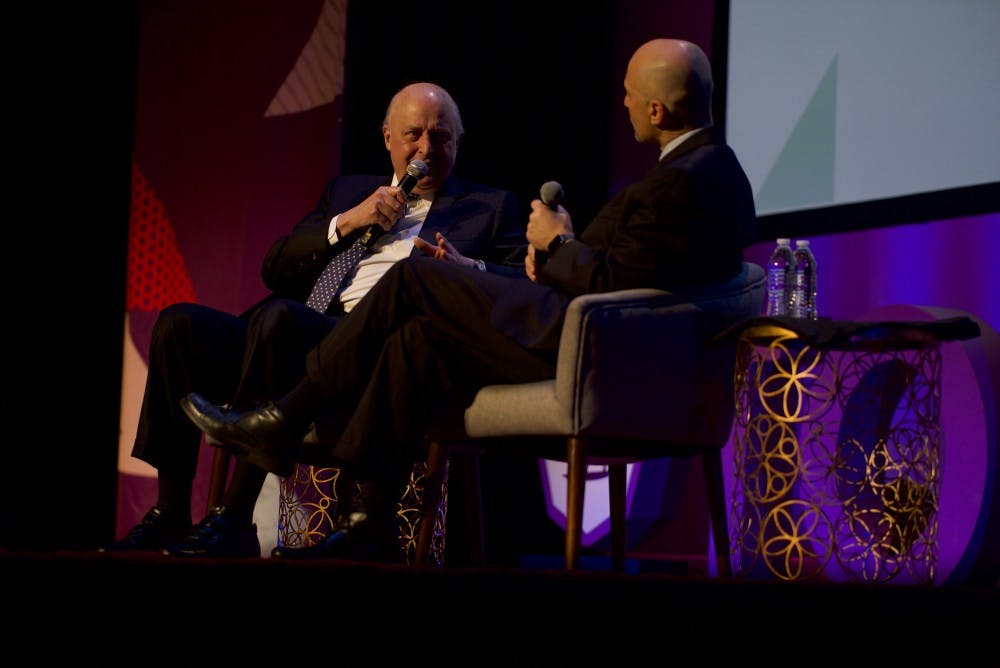Former diplomat and political appointee John Negroponte will be appointed to a yearlong endowed professorship in the Miller Center for Public Affairs. Negroponte is a former U.S. ambassador and U.S. Deputy Secretary of State, and he served as the nation’s first Director of National Intelligence. The appointment is expected to be formally announced by the Center Tuesday.
The James R. Schlesinger Distinguished Professorship is awarded annually to an individual who has served the United States in national security and international affairs. The professor reflects on his or her tenure in public service at the Miller Center, a bipartisan think-tank focused on studying the American government.
In an interview with The Cavalier Daily, Negroponte described the move from the public sector to academia as “not totally seamless.”
“Working in government is a kind of qualitatively different experience,” Negroponte said. “It’s more tense and intense … I think academia is not exactly that kind of pace, but what you get in return is a little bit more time to reflect.”
As the Schlesinger Distinguished Professor, Negroponte will participate in events and lectures at the Miller Center, the Batten School of Leadership and Public Policy, the School of Law and the history and politics departments. He will also contribute publications to the Miller Center’s website.
“Ambassador Negroponte is widely respected in both parties. He is an exceptional intellectual, an experienced and distinguished practitioner, and a genuinely fine human being who enjoys engaging with students and faculty alike,” Miller Center Director William Antholis said.
For Negroponte, this professorship is not his first opportunity to reflect on his governmental experience. In 2009, after 44 years working for the U.S. government, Negroponte became a professor of international relations at Yale University — his alma mater — and then moved to The George Washington University in 2016.
Negroponte added that he’s been passionate about international relations since he was a teenager.
“That was all I wanted to do, since the age of about 15, was to work on diplomacy and foreign affairs,” he said. “As a result, I went into the foreign service when I was 21 years old, and was pretty much obsessed with that line of work ever since.”
His self-described obsession led him into various roles, but his personal favorite was his time as the U.S. Ambassador to Mexico, during which he negotiated the North American Free Trade Agreement.
One of his most controversial positions, was his role as the U.S. Ambassador to Honduras under former President Ronald Reagan in 1981.
Negroponte was assigned to an ambassador post during a tumultuous time for both Honduras and its neighboring countries, as the government was facing revolutionary threats from communist insurgents.
The Honduran government created a security force charged with shutting down insurgencies. The group used extralegal tactics — including kidnapping, stalking, torturing and even murder — to curtail political opposition. Meanwhile, the U.S. expanded its military aid to Honduras from $4 million to $77.4 million per year.
Years later, The Baltimore Sun reported that Negroponte was aware of the Honduran government’s human rights abuses, but did not share them with the his superiors in Washington. The Washington Post wrote that Negroponte’s “anti-communist convictions led him to play down human rights abuses in Honduras, the most reliable U.S. ally in the region.”
Negroponte denies wrongdoing from his time in Honduras.
“I have no regrets about my service in Honduras,” Negroponte said. “I know there’s been a certain amount of critical material written about my time there … Most of it [was because] I got caught up in the controversy of the time, because there were many people who were opposed to Ronald Reagan’s policies … And I was carrying out his policies.”
Howard Witt, the director of communications and managing editor for the Miller Center, said the Center has not experienced significant internal conflict over the appointment.
However, not all of the Miller Center’s recent appointments have been received as smoothly. This summer, Marc Short, a former aide to President Donald Trump, was appointed as a senior fellow at the Miller Center, triggering two history professors affiliated with the Center to resign their posts.
The professors do plan to continue their roles in the history department, but wrote in their letter to Antholis that the decision to hire Short “runs counter to the Center’s fundamental values.”
“[We should] keep in mind that we have senior fellows from across the political spectrum, both liberals and conservatives,” Witt said in an email to The Cavalier Daily. “But people understand that our nonpartisan mission requires that we engage a broad range of previous government officials from both [Democratic] and [Republican] administrations.”







